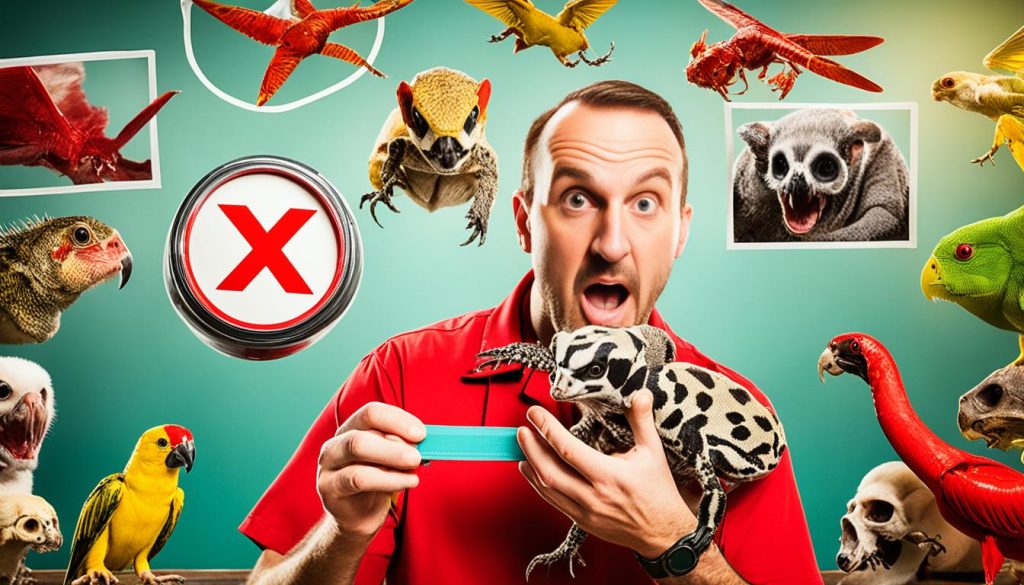More and more people are bringing exotic animals into their homes. These animals are often seen in online videos that get lots of views and shares. But, these videos don’t show the real life of owning one of these animals1. It’s not just about how cute they look.
Owning an exotic pet is a big deal. It means you’ll need to spend a lot of money on special care and vet bills. You also have to think about the risks to both the animal and yourself. This article will look into the real costs and commitment of having an exotic pet. We want to help you make a smart choice before getting an exotic animal as a pet.
Key Takeaways
- Exotic pet ownership requires specialized care, including regular feeding, socialization, and handling.
- There is a limited number of veterinarians qualified to treat exotic animals, leading to higher costs.
- Exotic pets can pose risks to their owners, including the transmission of zoonotic diseases.
- The cost of owning an exotic pet can be significantly higher than a traditional domestic pet.
- Responsible pet parenting involves considering the unique needs and challenges of exotic animals.
What is Considered an Exotic Pet?
What makes an exotic pet? It’s a question that covers a broad range of wild animals kept as pets. The International Fund for Animal Welfare (IFAW) defines an exotic pet as a wild, non-domesticated animal kept for companionship2. This includes everything from big cats and snakes to birds and turtles – any animal not typically kept as a pet.
Understanding the Definition of Exotic Pets
The IFAW focuses on exotic pets that were traded illegally, could spread diseases, or face poor welfare in captivity2. These pets are wild animals needing special care and housing. Owning them comes with unique challenges and duties.
Types of Animals Classified as Exotic Pets
- Reptiles (snakes, lizards, turtles)2
- Amphibians (frogs, toads)2
- Birds (parrots, songbirds)2
- Small mammals (sugar gliders, hedgehogs)2
- Fish (saltwater, freshwater)2
- Invertebrates (tarantulas, scorpions)2
These animals can be found in breeders, pet stores, or from private owners2. Some need care from experts like vets or breeders2. They often require special diets and homes and regular vet visits for health2.
Owning an exotic pet can be rewarding but comes with big responsibilities234. It’s vital to do your homework, prepare well, and promise to care for your pet’s needs234.
Legal Considerations for Owning Exotic Pets
Owning exotic pets in the U.S. has its own set of rules. These rules change from state to state and even within cities5. Some places let you have certain exotic pets with the right permits, while others don’t allow them at all. It’s important to know the laws where you live before getting an exotic pet.
State and Local Laws Governing Exotic Pet Ownership
Exotic pet laws vary widely across the country5. Some states let you have big animals like lions and monkeys with few rules, while others have strict bans6. This makes it hard for people to know if they’re following the law when they want an exotic pet.
The Illegal Wildlife Trade and its Impact on Exotic Pets
Even if exotic pets are legal, they might not have been gotten legally. The illegal wildlife trade is huge, taking millions of animals each year for pets and other reasons5. These animals are often not what they seem, making it hard to know where they came from5. Supporting this illegal trade is bad for the animals and the planet.
“The exotic pet industry in the U.S. is a lucrative business, drawing criticism from animal welfare advocates due to concerns about safety and animal welfare.”6
Owning exotic pets has many rules and changes often. It’s key to look into these laws and think about the ethics and practicality of having these pets. Knowing the laws and the issues with the exotic pet trade helps you make a choice that’s good for the animals and your community576.
The True Cost of Owning Exotic Pets: Are You Ready for the Commitment?
Owning an exotic pet can be rewarding but comes with a big financial cost. The price to buy these animals varies a lot, from very low to very high8. But, the cost to care for them over their lifetime is often very high. This includes special diets, vet care, and long-lived pets that need a lifelong commitment8.
Exotic pets need special homes, gear, and toys to keep them happy and healthy8. Unlike dogs and cats, their food and medical care can be hard to find and cost more8.
Before getting an exotic pet, think about the financial and time commitment needed for their care throughout their life8. Some pets, like dogs and cats, can live 18 to 20 years. Birds and reptiles can live even longer, up to 40 years or more. This shows how long you’re committing to care for certain pets8.
It’s key to research the needs and costs of the exotic pet you want9. Responsible pet owners know the financial commitment needed for their pets’ care9. They also plan for unexpected vet bills9.
Pet insurance can help cover unexpected medical costs8. Looking into different pet insurance plans can help find the right coverage for your pet10.
Deciding to own an exotic pet should be thought out carefully. Think about the costs, time, and your ability to give the special care these pets need for their whole life8910.
| Pet Type | Initial Costs | Recurring Costs | Lifespan |
|---|---|---|---|
| Dog | $200-$300 | $500/year | 18-20 years |
| Cat | $145-$130 | Varies | 18-20 years |
| Rabbit | Around $1,055 | Varies | 8-12 years |
| Exotic Bird | Varies | Varies | 40+ years |
| Reptile | Varies | Varies | 40+ years |
“Responsible pet owners understand the financial commitment required for proper pet care.”9
Deciding when a child can have a pet depends on their maturity and ability to care for an animal8.
Senior pet owners should pick pets that are easier to care for as they age and may face health issues8.
Owning an exotic pet is a big commitment that needs careful thought and financial planning. By understanding the true costs and responsibilities, you can make a well-informed decision for you and your pet8910.
Potential Harm to Animals and Ecosystems
The exotic pet trade worries many because it can harm animals and the environment. Many exotic pets face hard times in captivity and during transport11. They need special care but often get poor living conditions far from home.
Taking wild animals for pets can harm their natural homes. This can upset the balance of nature12. Over 100,000 non-human primates are kept in zoos and labs, showing the big problem here.
Captivity and Transportation Challenges
How animals are treated in captivity and during transport is a big worry. Many are kept in bad conditions, don’t get enough food, and suffer high death rates11. Pocket pets and exotic pets need special care and a good diet to live well.
Even if exotic pets make it through transport, their living conditions can be bad for them12. In 1985, a law was passed to help primates in captivity, but it’s not being followed. This is shown in a lawsuit against the USDA by the Animal Welfare Institute.
Ecological Impact of Escaped or Released Exotic Pets
Exotic pets that escape or are let loose can harm the environment. They can compete with native animals for food and harm endangered ones11. The Burmese python in Florida’s Everglades shows the damage exotic pets can do in new homes.
Introducing new species can mess up food chains and harm native wildlife, even leading to extinction13. The San Diego Zoo’s ticket prices show how much it costs to care for exotic animals. Releasing them into the wild is even more risky.
The exotic pet trade has big problems for animals and the places they live. Owning an exotic pet might seem exciting, but it can be very hard on the animals and harm the environment11. It’s important to think carefully and do your research before getting an exotic pet111312.
Health Risks of Owning Exotic Pets
Keeping exotic pets can be risky for your health. Many wild animals carry viruses and bacteria that can spread to humans. These diseases are called zoonotic diseases. In the last decade, scientists found that 75% of new diseases are from animals to humans, and 72% come from wildlife14.
These germs might not make the animals sick, but they can infect humans. So, an exotic pet might look healthy but can still carry diseases.
Zoonotic Diseases and Their Transmission
Dangerous diseases from exotic pets include Salmonella, Herpes B virus, Monkeypox, and Leptospirosis. You can get these diseases by touching the animal, its waste, or even breathing the same air. For every baby chimpanzee kept as a pet, ten were killed during capture, says the Not a Pet campaign14.
These pets are not domesticated, so their care is often misunderstood. This increases the risk of getting sick from them.
Safety Concerns with Wild Instincts and Behavior
Even young exotic pets can become dangerous as they grow. Their wild instincts and unpredictable behavior are a big risk to their owners. For instance, Burmese pythons, once pets, now threaten ecosystems like the Everglades in Florida14.
Exotic pets have attacked people, causing serious injuries and deaths. Owning them requires special training and precautions. Many people are not ready for this.
If you see illegal wildlife or worry about an exotic pet, call the U.S. Fish and Wildlife Service at 1-844-FWS-TIPS or fws_tips@fws.gov14. Knowing the risks can help you decide if an exotic pet is right for you and your family.
“Over the past fifty years, the world has decimated 68% of its wildlife population. Captive animals often undergo artificial insemination, leading to miscarriages, death at or shortly after birth, and mother rejection of young.”15
Comparing Exotic Pets to Domestic Pets
Owning an exotic pet is quite different from having a dog or cat. These pets need special diets and vet care from experts. They also live longer, which means a big financial commitment16. The care for exotic animals is harder and costs more than for domestic pets17.
Specialized Care and Costs for Exotic Pets
Exotic pets can be expensive to own. Prices range from $50 to over $10,000, with adoption fees between $50 to $20017. Vet visits cost $50 to $200, and special treatments can be over $50017. Things like enclosures and enrichment items add to the cost of caring for these pets.
Meeting the Unique Needs of Exotic Animals
Exotic pets need special care that’s hard to give in a home16. From the $1,000 White Peacock to the $20,000 Masked Angelfish, they all need dedicated owners18. If you’re not ready for this, domestic pets are easier to care for.
“Exotic pets have specialized care requirements that can be very difficult and expensive for the average household to properly provide. It’s crucial for anyone considering an exotic animal to thoroughly research their needs and be confident they can meet them.”
Conclusion
Owning an exotic pet is a big step that needs careful thought and planning. The costs, both money-wise and in time and effort, can be much more than people think19. For example, starting with a dog costs between $1,135 to $5,155, and cats are cheaper, costing $535 to $2,81019. Also, yearly costs for things like toys and vet visits are $260 to $1,005 for cats and $440 to $1,110 for dogs19.
Exotic pets can be risky for their owners and the planet, from spreading diseases to safety issues and harming the environment20. Sadly, over 75% of pet snakes, lizards, tortoises, and turtles don’t make it past a year with their owners. The 2019 World Animal Protection report showed that wild African grey parrots have lost up to 99% of their numbers in some places because of poaching20.
Even though exotic animals might look interesting, the work and challenges of caring for them can make domestic pets a better fit for most homes21. Last year, the RSPCA found homes for 105,079 animals, showing there are many domestic pets in need of love21. Before getting an exotic pet, people should really look into what it takes to care for them.
FAQ
What is considered an exotic pet?
Are exotic pets legal to own?
What are the costs associated with owning an exotic pet?
What are the potential harms to exotic pets and the environment?
What health risks are associated with owning exotic pets?
How do exotic pets differ from domestic pets like dogs and cats?
Source Links
- Ask An Expert: 5 Tips For Owning Your First Reptile
- What Is an Exotic Pet? Vet-Verified Info, Species, Legalities & FAQ | Hepper
- How to Budget for Pet Costs
- Before You Adopt: Planning a Lifelong Commitment to Your Pet’s Health (Published 2020)
- FAQ about exotic pets
- Wild Obsession
- 10 Things You Must Know Before Planning to Bring Home New PET In 2024
- Are You Ready to Get a Pet?
- Responsible Pet Owners Month 2024: When It Is & How It’s Celebrated – Dogster
- How to financially prepare for pet costs
- Virtual Workshop: Exotics & Pocket Pet Exams
- The Economics of Zoos – SmartAsset
- the hidden dangers of owning an exotic pet
- Why Wild Animals in Captivity Isn’t True Conservation
- The True Cost to Own a Pet
- Costly Companions: Budgeting for Your Exotic Pet’s Care – My Safari Love
- 25 Pricey Pets, Ranked From Least to Most Expensive
- How to Budget for a New Pet – Milli Bank
- 7 Reasons We Need to End the Exotic Pet Trade
- Argumentative Essay on Why You Should Own a Pet | HowToWrite by Customwritings.com



